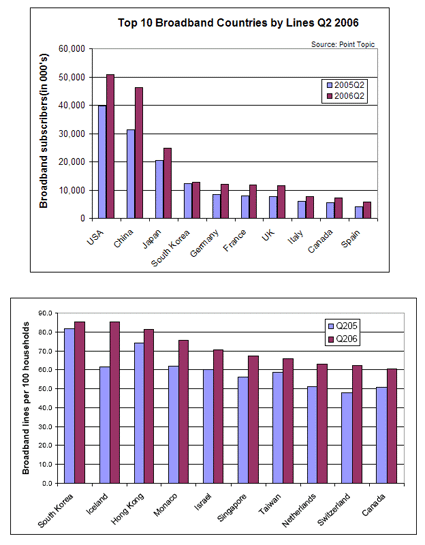TG Daily Top-10: Technology disappointments of 2006
Get Tom's Hardware's best news and in-depth reviews, straight to your inbox.
You are now subscribed
Your newsletter sign-up was successful
#4 Broadband Internet
It has been 10 years since I moved from Germany to the U.S. this year. And if there is one thing that I can remember from 1996's technology, then it is clearly how far ahead the U.S. was with the Internet. Back in Germany, we were happy, if we could get our dial-up connection to work. Almost unimaginable today, I had to share one CompuServe dial-up account with 20 other editors at Germany's second largest computer magazine at the time (and yes, we were proud of our little window to the world.)
As an intern at a super-edgy Chicago web-design agency, which, among others, developed a broadband (!) portal for Ameritech (which never went live), it was impossible to miss that the telco advertised a 1 Mb/s broadband DSL connection. It wasn't available to the public, but there was the promise to make it available "soon." As we know today, DSL did not arrive for another three, four years, and even those merger-mergers really didn't result in the kind of innovation they promised. But who cares? This country had an undeniable lead in Internet technologies and vision over every other nation on this globe.
That situation has changed dramatically in the past 10 years. Adventurous broadband providers, such as @Home, sparked excitement around the turn of the millennium, but were acquired and integrated into the big business of telecommunications and it appears we have gone into slow motion of broadband deployment since then.
Today, Broadband is available in most metropolitan areas in the U.S., but too few providers hold control over the expansion of high-speed Internet connectivity, fiercely protect their revenue sources, prevent the emergence of competition and negatively influence the availability of broadband. If you live in a rural area, broadband availability may be scarce and I would go as far as claiming that we are heading into yet another generation of digital divide.
Broadband data 2006. Source: Point-Topic
While the U.S. can still claim to have the largest base of installed broadband lines, China is on track to surpass the U.S. in early 2008, according to market research firm Point-Topic. U.S. providers only add half as many broadband lines as China annually and the U.S. has long dropped from the top-10 of countries with the strongest broadband growth. In terms of broadband penetration, the U.S. is trailing the top-10 with a distance - and ranks behind, for example, Iceland, Israel, Switzerland and Canada.
Broadband development is being stalled with fiber-to-the-home-projects missing most deadlines, telcos and cable providers hanging on to 30-year-old networks and battling municipalities that look for more competition and more progress in the broadband space. There is no denying that, today, broadband access in the U.S. has one of the most antiquated structures, slowest connection speeds and highest prices of any of the leading industry nations. It's mind-boggling that AT&T can compare a 1 Mb/s DSL line with a Dodge Viper in its TV commercials and Comcast can charge nearly $50/month for its 6 Mb/s cable broadband. I hate to bring it up guys, but 16 Mb/s are available for about $30 a month in many parts of Europe. And triple-play (voice, Internet, TV) is being rolled out with 100 Mb/s VDSL networks for about $130 a month. Yes, Verizon offers 30 MB/s FiOS Internet connectivity in certain parts of the country, but at $200 a month they can't be serious, right?
I could go on and take a swing at $60/month mobile broadband, but you get the point. U.S. broadband is not nearly as fast and high-tech anymore as the big ISPs claim. It's almost 2007 and simple broadband had enough time to become a commodity anywhere, anytime - and clearly, in the U.S., it is far from that goal.
The stalling development and distribution of DSL and cable Internet was once again one of the big tech disappointments of 2006. I can only hope that the telcos and cable providers get their act together, stop being afraid of new technologies such as WiMax and VoIP, focus a little more on the needs of their customers and spend less time lobbying in Washington D.C. A bit more competition wouldn't hurt either. Hopefully, we will be seeing some new ideas that allow this country to catch up with the rest of the world in 2007+.
Current page: #4 Broadband Internet
Prev Page #5 Microsoft Zune Next Page #3 Digital Rights ManagementGet Tom's Hardware's best news and in-depth reviews, straight to your inbox.
Tom's Hardware is the leading destination for hardcore computer enthusiasts. We cover everything from processors to 3D printers, single-board computers, SSDs and high-end gaming rigs, empowering readers to make the most of the tech they love, keep up on the latest developments and buy the right gear. Our staff has more than 100 years of combined experience covering news, solving tech problems and reviewing components and systems.

